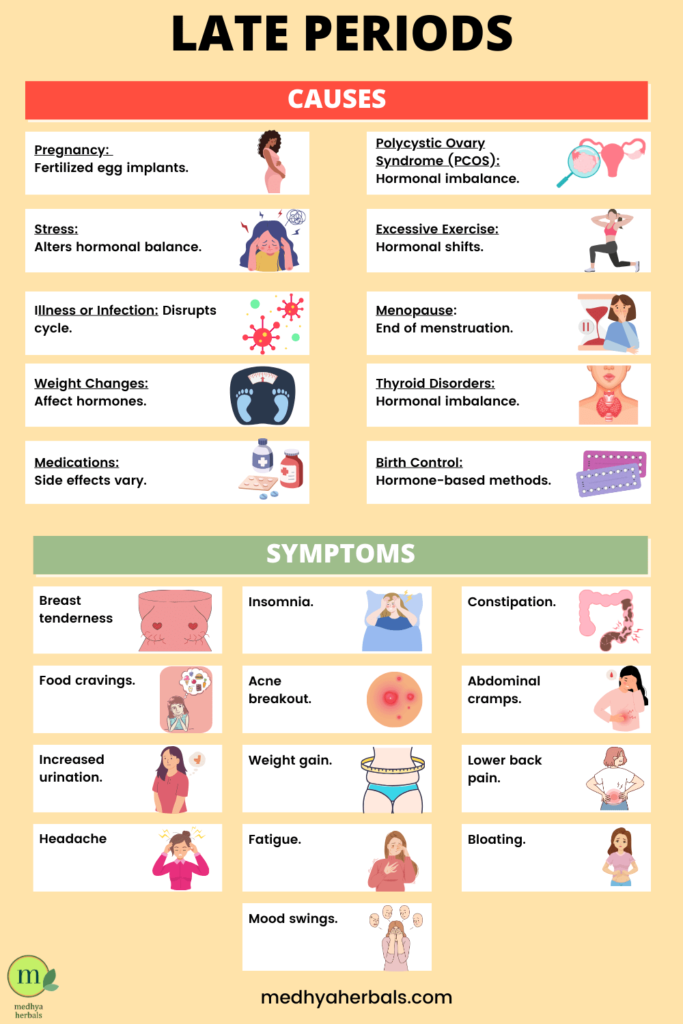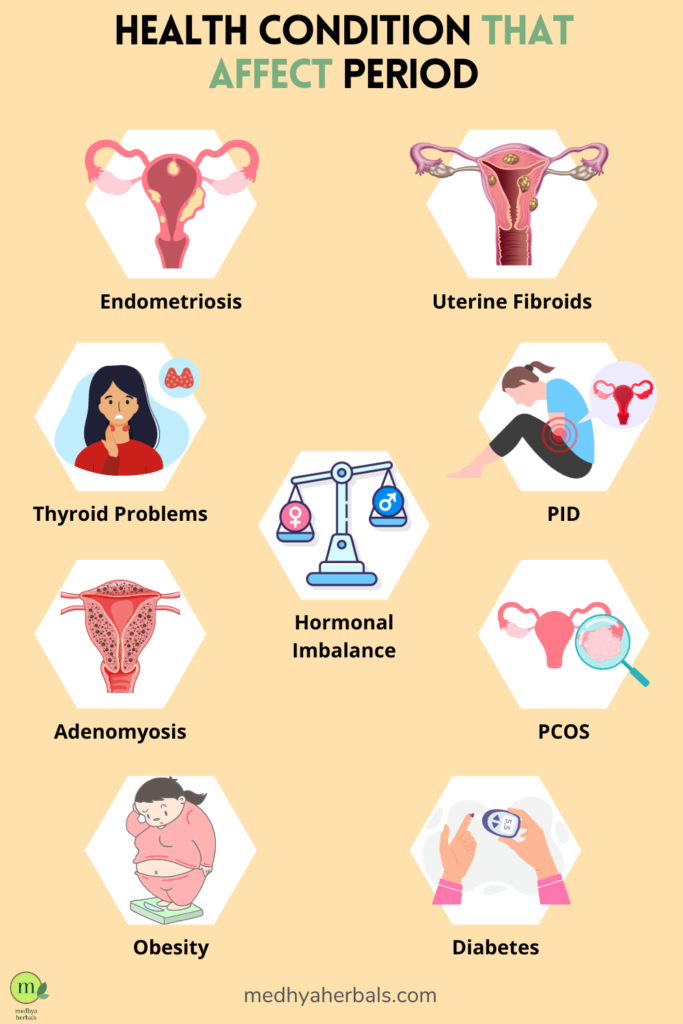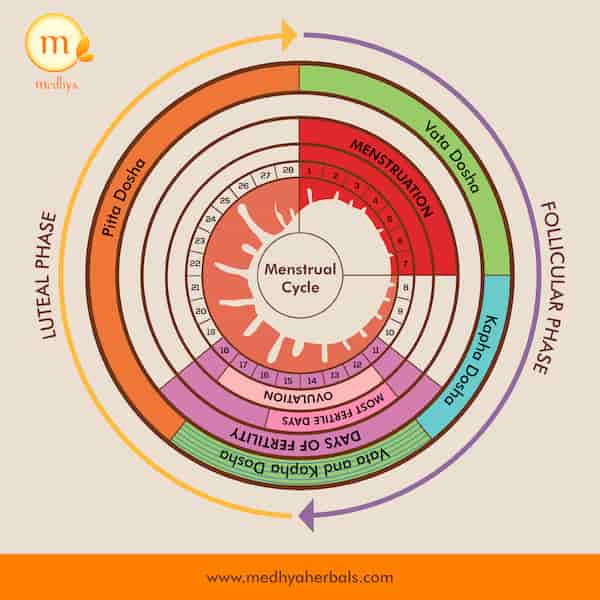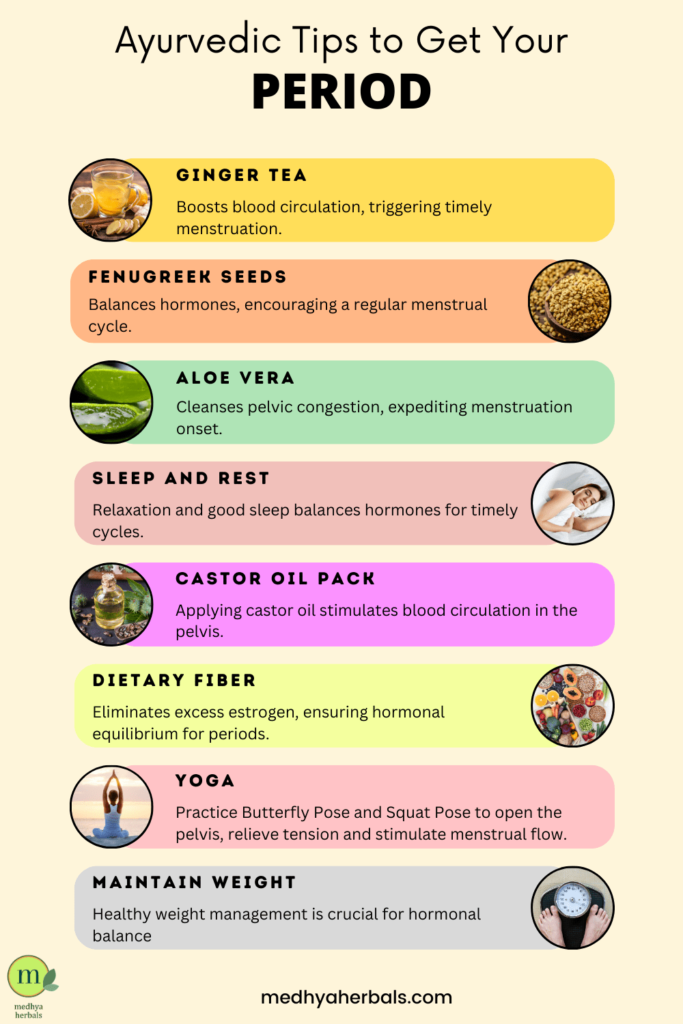If you’ve found yourself asking, “Why haven’t I gotten my period this month?” or wondering about the signs of a missed period, you’re not alone. Missed periods can stir up questions, uncertainty, and even anxiety. However, rest assured that our team of experienced Ayurvedic doctors at Medhya Herbals is here to guide you through this topic with expertise and compassion.
In this article, we will delve deep into the reasons behind skipped periods and late menstrual cycles. We’ll explore the common signs of a period coming late, how to differentiate them from pregnancy symptoms, and most importantly, how Ayurveda, with its holistic approach, can offer natural solutions for regulating menstrual cycles. Our goal is to provide you with valuable insights and practical steps to address this issue effectively while prioritizing your overall well-being. So, let’s embark on this enlightening journey together, as we unlock the secrets to understanding and managing late periods with Ayurveda.
Understanding Missed Periods

A “missed period” occurs when the expected menstruation does not commence as scheduled. In the context of the menstrual cycle, it usually refers to the absence of menstrual bleeding beyond the typical duration of the cycle. While the exact length of a normal cycle varies among women, a missed period is often a cause for attention if it exceeds the typical duration.
Common Signs of Missed Periods
Missed periods, also known as amenorrhea, can be a source of concern for many women. Understanding the signs and potential causes of missed periods is essential for addressing this issue effectively. In this section, we’ll explore the common signs associated with missed periods and delve into possible explanations.
- Absence of Menstrual Bleeding: The most apparent sign of a missed period is the absence of menstrual bleeding during your expected cycle. If your period doesn’t arrive when it typically does, it’s considered a missed period.
- Change in Menstrual Cycle Length: While a missed period is a clear indicator, some women experience changes in the length of their menstrual cycle. This can involve shorter or longer cycles than their usual pattern.
- Breast Tenderness: Some women may experience breast tenderness and swelling before their period. If this symptom is absent, it can be a sign of a missed period.
- Abdominal Bloating: Hormonal fluctuations associated with menstruation can lead to abdominal bloating. If you don’t experience this bloating when you expect your period, it can be indicative of a missed cycle.
- Mood Changes: Hormonal shifts during the menstrual cycle can affect mood. Women often report mood swings, irritability, or increased emotional sensitivity in the days leading up to their period. The absence of these emotional changes can signal a missed period.

Common Reasons for Missed Periods
The menstrual cycle is a delicate orchestra of hormones and bodily processes, and various factors can disrupt its harmonious rhythm, resulting in missed periods. Understanding these factors is key to addressing questions like “Why haven’t I gotten my period this month?”
Physical Factors
- Polycystic Ovary Syndrome (PCOS): PCOS is a common hormonal disorder that can lead to irregular periods or missed periods. It often involves the formation of small cysts on the ovaries and imbalances in hormones like insulin and androgens.
- Thyroid Disorders: An overactive or underactive thyroid can interfere with the menstrual cycle. Thyroid hormones play a vital role in regulating metabolism, and any imbalance can impact menstruation.
- Excessive Exercise: Intense physical activity, especially in athletes, can disrupt the menstrual cycle. The body may perceive high levels of exercise as a form of stress, leading to changes in hormone production.
- Sudden Weight Changes: Significant weight loss or gain can affect the body’s hormonal balance and lead to missed periods. This is often seen in eating disorders or rapid changes in body composition.
Emotional Factors
- Stress: Emotional stress, whether due to work, relationships, or other life events, can trigger changes in hormone production. Chronic stress can lead to missed periods as the body prioritizes survival over reproduction.
- Mental Health Conditions: Conditions like depression and anxiety can impact the menstrual cycle. The brain and reproductive system are intricately connected, and disruptions in mental health can affect hormonal regulation.
Lifestyle Factors
- Dietary Choices: Poor nutrition or extreme dietary restrictions can affect hormone levels and menstruation. A balanced diet is essential for overall health, including reproductive health.
- Alcohol and Substance Use: Excessive alcohol consumption and drug use can interfere with hormone regulation and disrupt the menstrual cycle.
- Medications: Certain medications, including some contraceptives and antipsychotics, may have side effects that affect menstruation. It’s essential to discuss these potential effects with a healthcare provider.
The Anatomy of Menstruation
A normal menstrual cycle typically lasts around 28 days, although variations ranging from 21 to 35 days are considered within the normal range. This cycle length is counted from the first day of one period to the first day of the next. However, it’s essential to remember that “normal” can vary widely among individuals, and what’s regular for one person may not be the same for another.

The menstrual cycle is divided into several distinct phases, each with its unique purpose and significance.
Menstrual Cycle Phases
- Menstruation (Days 1-5): This is the start of the menstrual cycle, marked by the shedding of the uterine lining. Bleeding occurs as a result of reduced levels of estrogen and progesterone, allowing the uterine lining to detach and be expelled from the body. This phase signifies the end of one cycle and the beginning of another.
- Follicular Phase (Days 1-13): After menstruation, the body begins to prepare for potential pregnancy. The brain’s pituitary gland releases follicle-stimulating hormone (FSH), stimulating the ovaries to develop follicles containing eggs. One dominant follicle eventually matures and releases an egg during ovulation.
- Ovulation (Around Day 14): This is a critical phase where the mature follicle ruptures, releasing the egg into the fallopian tube. Ovulation is marked by a surge in luteinizing hormone (LH) and a slight rise in basal body temperature. It represents a fertile window when conception is most likely.
- Luteal Phase (Days 15-28): If the egg is not fertilized, the ruptured follicle transforms into a structure called the corpus luteum, producing progesterone. Progesterone helps maintain the uterine lining in preparation for potential pregnancy. If fertilization does not occur, progesterone levels drop, triggering menstruation once again.
Importance of Regular Menstruation for Overall Well-Being
Regular menstruation serves as a vital indicator of a woman’s reproductive health and overall well-being. It reflects the harmonious interplay of hormones, the health of the reproductive organs, and various aspects of a woman’s lifestyle.
Hormonal Balance: A regular menstrual cycle is indicative of balanced hormone levels, including estrogen and progesterone, which are essential not only for fertility but also for maintaining bone health, heart health, and emotional well-being.
Reproductive Health: Consistent menstruation signifies the proper functioning of the ovaries, uterus, and other reproductive organs. Any irregularities may warrant further investigation.
Overall Health: The menstrual cycle is interconnected with a woman’s overall health, including her stress levels, nutritional status, and physical fitness. Irregularities in menstruation can be an early signal of underlying health concerns.
Ayurvedic Perspective on Missed Periods
In Ayurveda, a “normal” menstrual cycle is one that aligns with an individual’s Prakriti (inherent constitution). While Vata-dominant individuals might have shorter cycles, those with a predominance of Kapha may have longer cycles. Ayurveda prioritizes balance and harmony within an individual’s dosha constitution over a strict adherence to a standardized cycle length.
Ayurveda views menstrual health as an essential aspect of a woman’s overall well-being. While it recognizes individual variations, it also acknowledges that prolonged delays in menstruation beyond a typical range may indicate underlying imbalances.
Factors Affecting Menstrual Delay in Ayurveda
- Dosha Imbalances: Ayurveda considers imbalances in the doshas, particularly Vata and Pitta, as potential culprits for delayed periods. Vata imbalance can lead to irregularity and scanty flow, while Pitta imbalance may cause excess heat and heavy bleeding.
- Diet and Lifestyle: Poor dietary choices, excessive physical activity, and high-stress levels can disrupt the menstrual cycle. Ayurvedic principles advocate a balanced diet, adequate rest, and stress management to prevent such disruptions.
- Ritucharya (Seasonal Routines): Ayurveda highlights the importance of adapting routines according to the seasons. A failure to adjust one’s lifestyle and diet during specific seasons can contribute to menstrual irregularities.
- Ama (Toxic Buildup): The accumulation of ama, or toxins, in the body can interfere with the menstrual cycle. Ayurvedic detoxification practices may be recommended to address this issue.

Ayurvedic Remedies for Regulating Menstrual Cycles
Ayurveda offers a holistic approach to restoring menstrual harmony by addressing underlying dosha imbalances and promoting overall well-being. Here are some Ayurvedic remedies that can help regulate menstrual cycles:
Vata-Balancing Remedies
- Herbal Teas: Drink warm herbal teas with grounding herbs like ginger, cinnamon, and fennel. These can help soothe Vata and promote regular menstruation.
- Sesame Oil Massage: Regular self-massage with warm sesame oil can calm Vata imbalances. Focus on the lower abdomen and lower back.
- Ashwagandha: This adaptogenic herb helps combat stress and balance hormones. Consult an Ayurvedic practitioner for the appropriate dosage.
Pitta-Balancing Remedies
- Cooling Herbs: Include cooling herbs like aloe vera, coriander, and mint in your diet to alleviate excess heat associated with Pitta imbalances.
- Coconut Oil: Massaging the lower abdomen with coconut oil can have a cooling and soothing effect.
- Shatavari: This Ayurvedic herb is known for its hormone-balancing properties. It can be beneficial for women with Pitta imbalances.
Kapha-Balancing Remedies
- Spices: Incorporate warming spices like black pepper, cloves, and turmeric into your diet to counter Kapha imbalances.
- Dry Brushing: Dry brushing the body before a shower can help stimulate circulation and reduce Kapha-related lethargy.
- Triphala: Triphala, a blend of three Ayurvedic fruits, can aid in detoxification and balance Kapha.
Dietary and Lifestyle Recommendations
Ayurveda places great importance on diet and lifestyle in maintaining menstrual health. Here are some general dietary and lifestyle recommendations:
Diet
- Balanced Nutrition: Consume a balanced diet rich in fresh fruits, vegetables, whole grains, and lean proteins to provide essential nutrients.
- Warm and Nourishing Foods: Favor warm, cooked meals over cold or raw foods to pacify Vata. Incorporate ghee (clarified butter) for nourishment.
- Hydration: Stay adequately hydrated with warm herbal teas, warm water, and soups.
Lifestyle
- Routine: Establish a daily routine (Dinacharya) that aligns with your dosha constitution and adapts to seasonal changes.
- Yoga and Meditation: Engage in gentle yoga and meditation to manage stress and promote emotional balance.
- Exercise: Incorporate moderate, regular exercise that supports your dosha constitution without overexertion.
- Sleep: Ensure restful sleep by going to bed and waking up at consistent times.
Consultation with an Ayurvedic Practitioner
While these Ayurvedic remedies and recommendations can be helpful, it’s crucial to remember that Ayurveda is personalized medicine. Dosha imbalances and individual needs vary, and what works for one person may not work for another. Therefore, consulting with an experienced Ayurvedic practitioner is highly recommended.
An Ayurvedic practitioner can conduct a detailed assessment of your Prakriti (constitution) and Vikriti (current imbalances) to provide tailored recommendations. They can recommend specific herbs, dietary adjustments, and lifestyle modifications to address your unique menstrual health concerns effectively.
When to Seek Professional Help
While Ayurveda offers valuable insights and remedies, there are instances where seeking professional medical guidance is crucial:
- Severe Pain: Excruciating menstrual pain (dysmenorrhea) that significantly disrupts daily life should be evaluated by a healthcare provider.
- Very Prolonged Delays: If menstrual delays extend far beyond the typical range of an individual’s normal cycle length and are accompanied by other concerning symptoms, professional consultation is warranted.
- Irregular Bleeding Patterns: Irregular bleeding patterns, such as continuous spotting or heavy bleeding, may indicate underlying issues that require medical assessment.
- Menopause or Perimenopause: Women approaching menopause may experience significant changes in their menstrual cycles. Consulting a healthcare provider can help manage this transition effectively.
- Suspected Health Conditions: If there are signs of underlying health conditions, such as PCOS, thyroid disorders, or hormonal imbalances, medical evaluation is essential.
Conclusion
We understand how frustrating and worrisome it can be when you’re facing late periods, yet pregnancy is not the cause. The search for answers and relief can be daunting. However, we want to assure you that there is hope, and a solution rooted in the wisdom of Ayurveda can offer lasting relief.
Ayurveda, with its holistic approach, seeks not only to alleviate symptoms but also to address the root causes of your condition. It recognizes that each individual is unique, and by restoring balance to your dosha constitution and overall well-being, it can provide a path to permanent relief. We believe that you deserve a tailored and personalized treatment plan, and our team of experienced Ayurvedic doctors at Medhya Herbals is here to provide just that.
Don’t hesitate to take the next step toward better menstrual health and overall wellness. Schedule a consultation with our Ayurvedic doctors at Medhya Herbals, and let us embark on a journey toward understanding and healing your unique needs. Relief is within reach, and we are here to guide you every step of the way. Your well-being matters, and we’re committed to helping you achieve it through the healing power of Ayurveda.
FAQ
How can I make my period start?
Encouraging the start of your period naturally involves a few self-care practices. Staying relaxed, managing stress through techniques like meditation and yoga, and ensuring a balanced diet can help support a healthy menstrual cycle. Additionally, some women find that herbal remedies, such as consuming warm ginger or cinnamon tea, can help stimulate menstruation. However, if your period delay persists or if you have specific concerns, it’s advisable to consult with a healthcare provider or an Ayurvedic practitioner for personalized guidance and assessment of any underlying issues.
What is discharge before period?
Discharge before your period is a common and natural occurrence in the menstrual cycle. This discharge, known as cervical mucus, is produced by the cervix and changes in consistency and color throughout the menstrual cycle. Leading up to your period, it’s normal to experience an increase in cervical mucus, which may appear as a thicker, white or creamy discharge. This change is often associated with hormonal fluctuations and typically serves as a protective and lubricating mechanism for the reproductive system. However, if you notice any unusual or concerning changes in your vaginal discharge, it’s essential to consult with a healthcare provider for further evaluation and guidance.
How much delay is normal in periods?
The concept of a “normal” delay in periods can vary among individuals and is influenced by various factors. In a typical menstrual cycle lasting around 28 days, a delay of up to 7 days may still be considered within the normal range. However, what’s crucial to understand is that “normal” cycle lengths differ from person to person, with variations ranging from 21 to 35 days being considered normal. Factors such as stress, dietary changes, illness, and hormonal fluctuations can all contribute to occasional delays. Nonetheless, if you consistently experience delays beyond your usual cycle length or have concerns about your menstrual health, consulting with a healthcare provider or an Ayurvedic practitioner is advisable to rule out any underlying issues and receive personalized guidance.
Can period blood get blocked?
No, period blood cannot get blocked within the body. Menstrual blood flows out of the uterus through the cervix and into the vagina before exiting the body. It is a natural process, and the body is designed to expel menstrual blood. Sometimes, it may seem like blood is “blocked” if there is a slow flow, which can occur due to factors such as cervical stenosis (a narrowing of the cervical opening) or the use of certain menstrual products. However, these situations do not involve a complete blockage of menstrual blood, and it eventually finds its way out of the body. If you have concerns about your menstrual flow or experience unusual symptoms, it’s advisable to consult with a healthcare provider for a proper evaluation.
How long can stress delay your period?
Stress can indeed affect your menstrual cycle, potentially leading to delays in your period. The extent of delay can vary from person to person. Stress triggers the release of stress hormones like cortisol, which can disrupt the delicate balance of hormones necessary for a regular menstrual cycle. In some cases, high stress levels can lead to anovulation, where an egg is not released from the ovaries during the menstrual cycle, causing a missed period. While occasional stress-related menstrual irregularities are common, chronic stress can lead to more prolonged delays. Generally, once stress levels decrease and hormonal balance is restored, the menstrual cycle should return to normal. However, if stress-related menstrual irregularities persist or if you have concerns about your menstrual health, it’s advisable to consult with a healthcare provider or an Ayurvedic practitioner for guidance and evaluation.
References

